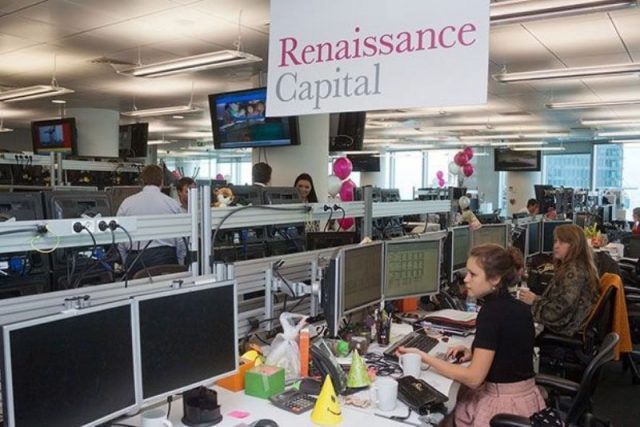SUN 19 DEC, 2021-theGBJournal- On 16 December 2021, Renaissance Capital held an online press briefing ‘Emerging markets’ trajectory amid the pandemic, inflation growth and China slowdown’, hosted by the Firm’s top research experts Daniel Salter, Head of Research, Eurasia/Head of Equity Strategy, and Charles Robertson, Global Chief Economist, Head of Macro Strategy Unit.
Here are some of the Key highlights
Charles Robertson, Global Chief Economist, Head of Macro Strategy Unit, Renaissance Capital
Despite high US and UK inflation, bond yields in developed markets continue to be extremely low, and this has a lot to do with demographics because the relatively high average and median age of Western populations translates into a fairly heavy savings surplus among households. This contrasts with very low savings in young countries of the world, including Sub-Saharan Africa. We continue to believe that this surplus will go from the West to Africa, among other regions.
Our base case for Russia is that no one is looking for a conflict and there probably won’t be one. However, it does look like investors are playing it safe just before the Christmas break and deciding to reduce their overweight positions, after being quite bullish on Russia. We believe that things should be easier through 2022 and would not be surprised if investors come back to Russia as soon as January.
We think South Africa has had its best year in terms of a really strong current account surplus, which has been very supportive for the national currency for most of 2021, although that has begun to fade in the past couple of months with US dollar strength and commodities weakening. There are also background concerns about SA’s debt levels. For all those reasons, we haven’t seen much enthusiasm about SA lately.
Speaking of big-picture risks, inflation in itself is not a problem, but a global recession would be. We believe that the Evergrande collapse story is still the biggest threat for EM in 2022, because if China goes into recession, emerging markets will face serious headwinds because of commodity prices, which might trigger political changes in some EM.
In Africa, we have seen a big shift in pricing of African eurobonds, which was caused by recent delays with the additional SDR allocation and investors starting to understand that many of these countries will be rescued neither by ever-rising commodity prices nor by massive SDR allocations. Meanwhile, government debt to revenue ratios look really concerning, and many regions are struggling to increase revenue to improve those ratios, as well as decrease their interest burdens.
A key question is to what extent borrowings by low-income countries can support export growth to help them ultimately pay off their dollar debt burden. Vietnam has been doing great in this respect in the past 10 years, as has DR Congo. However, for the majority of regions the debt has not produced any big improvement in export performance.
Debt markets investors are concerned by government debt to revenue ratios and interest burdens and, with US bond yields very low and frontier markets’ bond yields pretty low, this may all translate into more credit rating downgrades in 2022. However, we expect almost no rating downgrades for emerging markets.
In terms of the progress of COVID-19, we are concerned about China because the data suggest that it has not been able to suppress the Delta variant – and with the Omicron variant added there is a high chance that the entire country may be infected by the end of February. Short-term, China may have to impose very strict lockdowns in the next few months.
Daniel Salter, Head of Research, Eurasia/Head of Equity Strategy, Renaissance Capital
Emerging markets have had a lot to deal with this year, including the crackdown in the Chinese tech sector, the slowdown in the Chinese economy, Evergrande and dealing with the real estate problems in China, and various variants of the coronavirus – whether Delta or Omicron. But aside from China, I think the really big one was the repricing of the Fed’s rate hike cycle – be it pricing in the taper and then an acceleration of the taper, and now a move towards pricing in three rate hikes in 2022.
It looks like emerging markets are quite underowned as they come out of more than a decade of underperformance. According to our data, investors globally have about 8% exposure to emerging markets in their global portfolios, which is a relatively low level, bouncing around the same figure for the past five or six years, and it is significantly lower than it could be if investors had a neutral share of EM vs the index, which is about 12%, or even higher if they tried to replicate the structure of global GDP, where EM accounts for a hefty 40%.
Many things have driven the multi-year underperformance of EM, but in terms of the rebound we have come to see that the dollar is very important, and we have not seen the nice and steady dollar decline that EM particularly likes for a quite a long period now. However, we believe that 2022 may see a sweet spot for EM, with inflation very likely starting to ease; meanwhile, markets seem to have already priced in an accelerated taper and almost three rate hikes in 2022.
At the same time, we expect corporate capex to pick up to beef up supply chains and accommodate the pick-up in demand – we see that to be a net flow out of the dollar in to EM, given labour shortages in DM. Sector-wise, if we do think that inflation over the longer term is going to be structurally higher, energy, materials, utilities and financials are the sectors to look at in EM.
Within EEMEA, the biggest opportunity at the moment is probably Russia, as we expect geopolitical tensions to calm down in 1Q22. We think Russia’s oil stocks are pricing in a long-term oil price of under $50/bbl, which in our opinion is likely to prove too conservative given underinvestment in the upstream industry, and implies significant upsides. The market’s dividend yield of 10% exceeds the yield on local currency government debt, and is the highest in EM. Also, Russia is ahead of the rest of the world in terms of the interest rate hike cycle, which we expect to peak this month, with rates starting to come down in mid-2022, which we see as supportive for the equity market.
Interestingly, Russia is already the largest overweight by GEM funds, and at the same time, local investors are very much interested in the stock market because an average 10% dividend yield is much higher than one can get on a bank deposit, with local investors having bought around 2% of the Russian free float YtD, by our calculations.
Elsewhere, we think that Central Europe looks interesting, with quite aggressive interest rate hikes across the region and little chance of the economic recovery derailing. Among smaller emerging and frontier markets, we like industrialisation stories such as Vietnam and Bangladesh – countries that are moving up the quality curve of what they are producing and exporting. Kazakhstan is one of our top picks, with its very robust economy, big budget surplus and reform agenda from the government. Egypt and Georgia are also attractive in terms of their valuations, but come with their own risks.
With ESG inflows accounting for about a quarter of all YtD inflows in GEM funds, we can be sure that ESG is becoming absolutely mainstream, driven by many factors. However, there is a lot of debate around what it really means, how to deal with the carbon transition and what is the sense of divesting entire sectors such as O&G.
We have found that over 70% of a country’s ESG score is driven by GDP per capita and argue that poorer countries should not be penalised – what we should be looking at is where a country’s score is vs its level of wealth. We also need to explore the improvers’ and deteriorators’ stories, but best of all we should be looking at the deviation of overall ESG scores from where a region ought to be given its level of wealth.
Twitter-@theGBJournal|Facebook-The Government and Business Journal|email: govandbusinessj@gmail.com










